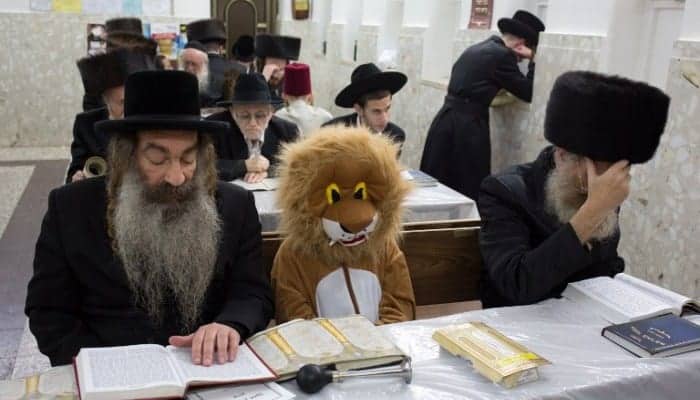Laws and Customs of Purim
Laws and Customs of Purim (From Gateway to Judaism, Mordechai Becher, Mesorah-Artscroll)
- Purim is preceded by the Fast of Esther on the 13th of the Hebrew month of Adar (usually corresponding to late February or early March). The fast begins at dawn and ends at night. It commemorates the fact that Queen Esther and the Jews of her city fasted before she entered the king’s chambers to ask him for clemency for the Jewish people. The fast also teaches us that the appropriate national or personal response to trouble is repentance and prayer. It is held on the day in which the Jews fought and successfully defended themselves against their enemies. Significantly, the celebration is not held on the day of the battle but rather on the day after the battle. The focus of our celebration is Jewish survival rather than the downfall of our enemies.
- Purim begins on the night of the 14th of Adar and continues until the next night. In ancient walled cities, like Jerusalem, Purim is celebrated on the 15th of Adar and is called Shushan Purim. This marks the fact that the Jews in Shushan, the Persian capital and a walled city, continued the battle for an additional day. Thus they still fought on the 14th of Adar, and celebrated on the 15th of Adar.
- The Scroll of Esther (Megillat Esther) is read publicly from a parchment scroll at night and in the morning. The blessings that are recited before and after the reading of the Megillah can be found in The Complete ArtScroll Siddur pp. 786 – 789.
- Although one should listen in silence to the reading of the Megillah, it is customary to make noise when the name of Haman is mentioned. This is done in symbolic fulfillment of the Torah’s commandment to erase the memory of Amalek (Haman’s nation). It is common practice to come to synagogue equipped with noisemaking devices (groggers) for this purpose, although some synagogues distribute them to the children.
- The prayer Al Hanissim is added in the silent prayers (Shemoneh Esreh) of Purim and in Grace After Meals. See The Complete ArtScroll Siddur pp. 114-116 and pp. 186-187. If one forgot to say Al Hanissim, one does not repeat the prayer.
- A special portion of the Torah is read on Purim (Exodus 17:8-16).
- Specific prayers that are omitted on happy occasions are also omitted on this day.
- Mishloach Manot, a gift of food, should be given to at least one friend, but the more the merrier. The gift should contain at least two, ready-to-eat items of (kosher!) food.
- Gifts to the po0r, Matanot La’evyonim, are also distributed on Purim. One should give to at least two poor people, but the more the better. Ideally, one should spend more on gifts to the poor than on gifts to friends. One should give the poor person at least enough money to cover one decent meal. On Purim, we are indiscriminate in giving out charity — one should give to anyone who asks.
- A festive meal is eaten on Purim afternoon. As with all traditional Jewish meals, it should start with the blessing over bread. One should ensure that there is wine in abundance and obviously, special foods. We invite guests, exchange insights about Purim, and sing traditional Purim songs.
- Although there is no prohibition against working on Purim, there is a universal custom not to engage in work or business on this day.
- It is customary for children, and many adults, to dress up in costumes. It is also common for communities to stage a Purim shpiel, an entertaining play on the Purim theme.

